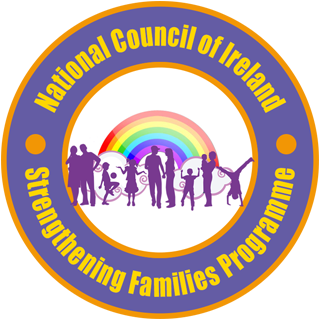Strengthening Families Programme Overview
The Strengthening Families Programme (SFP) is an evidence-based 14-week family skills training programme that involves the parents and teens/children in three classes run on the same night once a week. Families enjoy a meal on arrival, then parents and teens /children engage in separate skills based sessions for 1 hour. This is followed by a family skills session in the second hour, where skills are practiced with parents and teens/children. Incentives such as rewards for attendance, childminding and transport are also offered to enable families to complete the programme and remove barriers to attendance (UNODC, 2009). SFP can be applied across all prevention levels of support for families, and particularly targeted towards Level 2 and Level 3.
SFP Development
SFP was developed in the USA by Dr. Karol Kumpfer and associates at the University of Utah, in 1982. The programme has been adapted to many age ranges including 3-5 years; 6-11 years; 10-14 years; 12-16 years; and is available in web format for 10-16 years and DVD for 8-16 years. The shorter version such as the 7 week 10-14 years programme is suitable for universal families and the longer versions such as the 14 week 6-11 and 12-16 programme are targeted at high risk families.
SFP has been culturally adapted to suit many populations and has also been translated into different languages. Similar results have been found for culturally adapted SFP programmes but with the added advantage of making recruitment and retention of families much easier. The Strengthening Families Programme is now operating across 27 countries.
Principles
SFP is designed to reduce multiple risk factors for later alcohol and drug use, mental health problems and criminal behaviour by increasing family strengths, teens /children’s social competencies and improving positive parenting skills. It focuses on building family protective factors such as parent-child relationships, communication, cohesion, social and life skills, resisting peer influences, family organisation and attachment; and reducing risk factors such as conflict, excessive punishment, family drug and alcohol abuse, truancy, depression, etc. Further information can be found on www.strengtheningfamiliesprogram.org .
SFP in Ireland (12-16 and 6-11)
In 2007, the first SFP for 12-16 years was implemented in Cork, led by the HSE Drug & Alcohol Services, Local Drugs Task Force and Regional Drugs Task Force. Since then, multiple sites across Ireland have developed SFP 12-16 in their areas (spread across all 4 provinces) and some sites are also currently in process of developing the SFP 6-11 programme. Many of these are coordinated by Local/Regional Drugs Task Forces and Probation Services/Le Cheile. An interagency approach has proven fundamental to its successful implementation, involving a collaboration of statutory, community and voluntary agencies and volunteers. Results from evaluations can be requested from areas that have implemented the programme. A National SFP Council of Ireland has been established, to facilitate an inter-regional joined-up approach to the development of SFP in Ireland. The members are made up of multi-site SFP Coordinators and Trainers who have coordinated the implementation of SFP in their areas.
Selected SFP Studies and Reviews
In a study of the effectiveness of a culturally adapted Strengthening Families Programme 12-16 years for high risk Irish families involving over 200 families, all 21 measured outcomes had statistically significant positive results. Results showed significant improvements in all of the outcomes measured including 100% or five of five family outcomes, 100% or five of five parenting outcomes, and 100% or eight of eight youth outcomes. Larger effect sizes were found for the Irish families than the USA families. This study cited SFP 12–16 as effective in reducing behavioural health problems in Irish adolescents, improving family relationships and reducing substance abuse.
Significant changes in the parents and in the family environment and family resilience and in the children’s outcomes such as concentration and covert aggression were demonstrated. There were also statistically significant improvements in the areas measured for Overt Aggression (fighting, bullying,etc.), Covert Aggression (lying, stealing, etc.), Depression, Social Skills, Hyperactivity, Concentration and Criminal Behaviour. These risk factors were identified in the study as the most important in reducing later substance use and abuse.
Reference:
Kumpfer, K.L., Xie, J. & O’Driscoll, R. (2012). Effectiveness of a culturally adapted Strengthening Families Program 12-16 Years for high risk Irish families. Child and Youth Care Forum, 41 (2), pp.173-195 Sage Publications.
The Strengthening Families Programme is disseminated worldwide by the United Nations Office of Drugs and Crime (UNODC) as an effective evidence based family intervention. The UNODC refers to the current level of evidence on the Strengthening Families Programme as the following (2010: 18).
- 8 independent randomized control trials
- 10 randomized control trials
- over 100 quasi-experimental studies
Randomized control trials found that the programme consistently yielded the following results on the basis of a five-year follow-up measure (UNODC, 2010:20):
-The Parent Training component improves parenting skills, parenting efficacy, parental confidence, monitoring and supervision and parent-child involvement and decreases negative child behaviour, overt and covert aggression and conduct disorders.
-The Children’s Skills Training component improves children’s grades and social competencies (e.g communication, problem-solving, peer resistance and anger and behavioural control).
-The Family Skills Training component improves family attachment/bonding, harmony, communication, organization, family strengths and resilience.
The full Strengthening Families Program (comprising all three components) reduces alcohol and drug use or the likelihood of initiation of alcohol or drug use by parents and older children, improves protective factors and reduces risk factors predictive of later problem behaviours.Reference:
United Nations Office on Drugs and Crime (2010) Compilation of Evidence-Based Family Skills Training Programmes, United Nations, New York.
